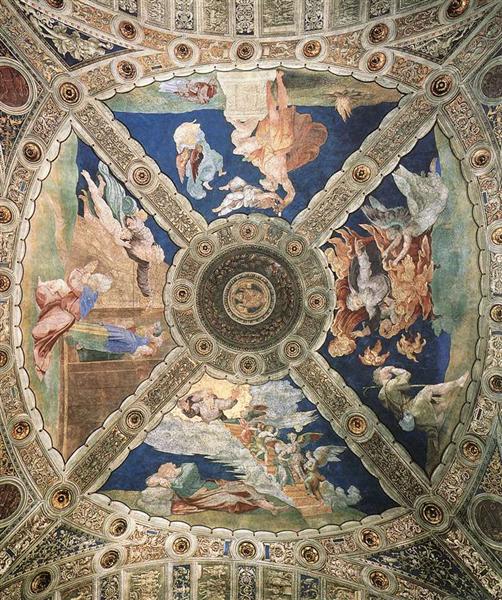Description
The work "Ceiling - 1514" by Raphael, a leading exponent of the Renaissance, is one of his most emblematic contributions to the decoration of spaces. This mural painting, originally located in the Vatican Palace, evokes not only the artist's technical mastery, but also his sublime ability to fuse architecture and painting into a harmonious whole. Although the title and context may give the impression of a mere architectural element, this work transcends its decorative function, becoming a visual manifesto that sums up an era of artistic and spiritual splendor.
From the first glance, the work reveals a rich exploration of perspective and composition. The diagonal planes and the arrangement of the figures create a sense of depth that invites the viewer to ascend towards the sky. Raphael uses the tetrachromy characteristic of his style, which combines a palette of blues, golds and creams with subtle terracotta nuances. These colors not only embellish the surface, but also function as a visual language, suggesting the passage of time and the transition between the earthly and the heavenly. The chromatic display is carefully orchestrated to guide the viewer's gaze and highlight the monumentality of the architecture depicted.
One of the most intriguing aspects of this work is the way Raphael approaches the human figure. Although “Ceiling – 1514” may not feature a diverse cast of historical or mythological characters, the figures that ornament the space exhibit significant grace and dynamism. They are arranged in such a way that they appear to flow in space, as if engaged in a celestial dance, demonstrating the deep understanding of movement and anatomy that Raphael mastered. The natural poses and interactions between the figures suggest both thematic cohesion and a dialogue between art and spirituality.
The use of light in this work is another of the elements that stands out. The lighting, subtly manipulated, creates shadows and reflections that add volume to the figures and give life to the scene. This resource also establishes a dramatic contrast that accentuates the architectural spaces, conferring an almost sacred monumentality to the space represented. Raphael's mastery in playing with light and shadow not only demonstrates his technical ability, but also reinforces the notion of the connection between the material and the divine, so present in the Renaissance.
While “Ceiling – 1514” may not be as widely recognized as Raphael’s other masterpieces, such as “The School of Athens” or “The Marriage of the Virgin,” its significance lies in its depiction of the Renaissance ideal. Raphael, with his characteristic balance between emotion and reason, brings in this work a hopeful vision of the world, where beauty and spirituality meet. It fits within the broader context of the High Renaissance style, where art becomes a vehicle for the exploration of knowledge, faith, and human experience.
In conclusion, “Ceiling – 1514” reveals itself not just as a simple decorative work, but as a complex expression of Raphael’s vision of the world in his time. With his mastery of form, color and light, the artist manages to create a space where the human and the divine seem to intertwine, inviting the viewer to reflect on his own relationship with the transcendental. This work, in addition to being a jewel in Raphael’s legacy, remains a lasting testament to the power of art to uplift the spirit and encourage contemplation.
KUADROS ©, a famous painting on your wall.
Hand-made oil painting reproductions, with the quality of professional artists and the distinctive seal of KUADROS ©.
Painting reproduction service with satisfaction guarantee. If you are not completely satisfied with the replica of your painting, we will refund 100% of your money.

